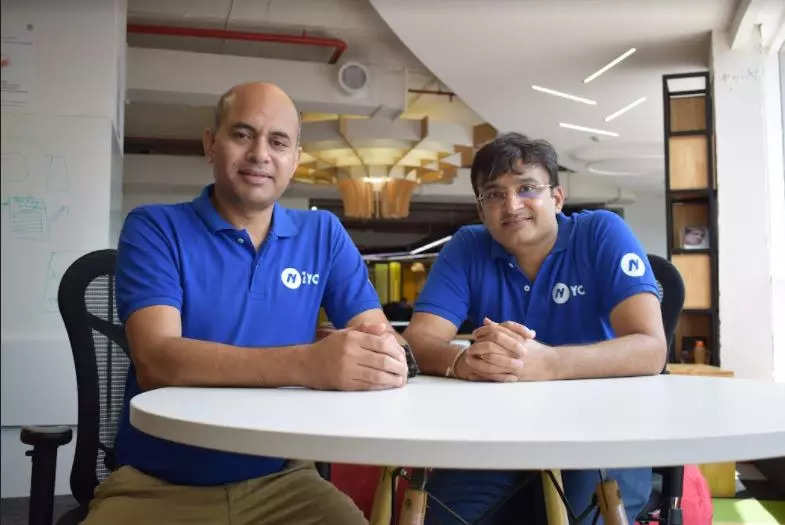Credit: Giphy
Also in this letter:
■ Edtech firms offer jobs guarantees amid tech talent war
■ Niyo raises $100 million and other done deals
■ Singapore raises concerns as India bans Free Fire
Data wiping malware hits hundreds of Ukraine computers

A newly discovered, destructive piece of software found circulating in Ukraine hit hundreds of computers, according to researchers at the cybersecurity firm Eset.
That was just a part of what Ukrainian officials said was an intensifying wave of hacks aimed at the country’s tech infrastructure in the lead up to Russia’s invasion on Thursday morning.
A new threat emerges: In a series of tweets, cybersecurity firm Eset said the data wiping programme had been “installed on hundreds of machines in the country”. The attack, it said, had likely been in the works for the past couple of months.
Cybersecurity experts are racing to pick apart the malicious programme. Researchers found it appeared to have been digitally signed with a certificate issued to an obscure, year-old Cypriot company called Hermetica Digital Ltd, which doesn’t appear to have a website.
Because operating systems use code-signing as an initial check on software, such a certificate might have been designed to help the rogue program dodge antivirus protections.
Getting such a certificate under false pretences – or stealing it – isn’t impossible, but it’s generally the sign of a “sophisticated and targeted” operator, said Brian Kime, a vice president at US cybersecurity firm ZeroFox.
Russia denies involvement: Who is responsible for the wiper is unclear, although suspicion immediately fell on Russia, which has repeatedly been accused of launching data-scrambling hacks against Ukraine and other countries. Russia has denied the allegations.
Cyber war: Ukraine has been repeatedly hit by hackers in the past few weeks as Russia massed troops around its borders. Earlier on Wednesday the websites of Ukraine’s government, foreign ministry and state security service were down in what the government said was the start of another denial of service (DDoS) attack.
Twitter mistakenly suspends accounts: Twitter said it had mistakenly suspended around a dozen accounts that were posting about Russian military movements, and said the action was not due to a coordinated bot campaign or mass reporting of the accounts by other users.
“We’ve been proactively monitoring for emerging narratives that are violative of our policies, and, in this instance, we took enforcement action on a number of accounts in error,” a Twitter spokesperson said in a statement. “We’re expeditiously reviewing these actions and have already proactively reinstated access to a number of affected accounts.”
Bitcoin crashes, altcoins follow: Bitcoin slumped to its lowest in a month on Thursday after Russian forces fired missiles at several cities in Ukraine and landed troops on its coast, sparking a sell-off of riskier assets.
The world’s most popular cryptocurrency fell by as much as 7.9% to $34,324, its lowest since Jan 24. Smaller coins that typically move in tandem with bitcoin also fell, with ether losing as much as 10.8%.
Edtech firms offer job guarantees amid war for tech talent

Edtech firms such as Simplilearn and Imarticus Learning are offering job guarantees to those who complete courses in a variety of fields, including machine learning, data analytics, data science, digital marketing, cybersecurity and java development.
Why? The move has been prompted by a huge demand-supply gap for people with these skill sets. The war for talent has been about acquiring digital skill sets, said a recent Aon Salary Increase Survey, which put attrition at 21% in 2021, the highest in around two decades.
Another reason for such job-guarantee programmes was the lack of quality education, experts said. “The gap in quality and industry-alignment that exists across a large part of the Indian higher education sector is the other factor responsible for such models, whereby job guarantee providers look to convert graduates into industry-ready working professionals,” said Amitabh Jhingan, partner, EY Parthenon Education Strategy Practice.
New trend: While upskilling companies have been providing job assistance for years, job guarantees are a relatively new concept. Experts said this model has been implemented in the US and is now picking up traction in India.
Who’s doing what: Simplilearn said the job guarantee model, which it currently offers to students of its data science and Java developers, had taken off in a big way. It plans to extend the programme to more courses, including digital marketing, cybersecurity and cloud computing in the next couple of months.
Imarticus Learning meanwhile offers a job guarantee for its flagship certified investment banking operations professional programme, and postgraduate programmes in data analytics and machine learning, digital marketing and cybersecurity. “Just last month, about 1,000 students from our data analytics and machine learning programme were placed in leading organisations,” said chief operating officer Sonya Hooja.
Niyo raises $100 million in fresh funding led by Accel, Lightrock

Niyo cofounders (from left) Virender Bisht (CTO) and Vinay Bagri (CEO)
Neobanking platform Niyo said that it has raised $100 million as a part of its new funding round, led by Accel and Lightrock India.
The round also saw participation from Beams Fintech Fund. Existing investors Prime Venture Partners, JS Capital also participated.
What will the funds be used for? The platform said it would use the proceeds from the current round to launch new lending and insurance products, and for brand building, inorganic acquisitions, and to bolster its team. The company is looking to double its headcount to 1,000 by the end of 2022.
Also Read | Explained: Neobanks, the next evolution of banking
Other done deals
■ Value retailer 1-India Family Mart has raised Rs 50 crore in funding from Dubai-based Gulf Islamic Investments (GII). The Carpediem Capital-funded retailer, which operates about 100 outlets in tier 2, 3 and 4 cities, said it would use the fund to expand outlets and to push its ecommerce and omni-channel strategies.
■ Subscription management platform Chargebee said it has acquired collections management platform Numbers and launched Chargebee Receivables.
■ Curefoods, a cloud kitchen company that houses brands such as EatFit, CakeZone and Great Indian Khichdi, announced the acquisition of the South India franchise rights for US-based pizza chain Sbarro. Curefoods plans to open around 50 Sbarro outlets in the next three years, starting with Karnataka.
Singapore raises concerns after India bans Free Fire mobile game

Singapore has raised concerns with India about its ban of the popular game Free Fire, owned by technology group Sea Ltd, in the first sign of diplomatic intervention after the move spooked investors, according to a Reuters report that cited sources.
Ripple effect: After the ban, the market value of the New York-listed Sea Ltd dropped by $16 billion in a single day. Investors were worried India could extend its ban to Sea’s ecommerce app Shopee, which recently launched in the country.
The sources, who include two Indian government officials, said Singapore had asked Indian authorities why the app had been targeted in a widening crackdown on Chinese apps, even though Sea has its headquarters in Singapore.
Singapore had queried if the app “was banned unintentionally,” said one of the Indian officials aware of the diplomatic initiative.
Chinese app crackdown: India blocked Free Fire this month along with 53 other apps it believes were sending user data to servers in China. China responded by expressing serious concern and saying it hoped India would treat all foreign investors in a non-discriminatory manner.
Meta unveils AI projects aimed at building the metaverse

Facebook owner Meta is working on artificial intelligence research to generate worlds through speech, improve how people chat to voice assistants and translate between languages, CEO Mark Zuckerberg said, as he sketched out key steps to building the metaverse.
- “The key to unlocking a lot of these advances is AI,” he said, speaking at the company’s live-streamed Inside the Lab event.
A brand new world: Zuckerberg said Meta was working on a new class of generative AI models that will allow people to describe a world and generate aspects of it. He showcased an AI concept called Builder Bot — which allows users to describe what they want the AI to generate.
Back in the real world: EU-US data transfers by Facebook and Instagram could be halted as soon as May, Ireland’s data privacy regulator said.
Catch up: Europe’s highest court ruled in 2020 that an EU-US data transfer pact was invalid due to concerns that US government surveillance may not respect the privacy rights of EU citizens.
That prompted Ireland’s Data Protection Commission (DPC) to issue a provisional order that the mechanism Facebook and Instagram uses to transfer data from European Union users to the US “cannot in practice be used.”
Meta’s response: The company has warned a stoppage will likely leave it unable to offer significant services such as Facebook and Instagram in Europe without a new transatlantic data transfer framework.
Twitter’s new public policy head in India: Meanwhile, Samiran Gupta has been named the new head of policy for the microblogging platform in India. He will lead the company’s public policy and philanthropy efforts in India and South Asia.
In February 2021, Mahima Kaul, who headed public policy for Twitter in India announced that she was stepping down from her role citing personal reasons.
Today’s ETtech Top 5 newsletter was curated by Arun Padmanabhan in New Delhi and Zaheer Merchant in Mumbai. Graphics and illustrations by Rahul Awasthi.
























